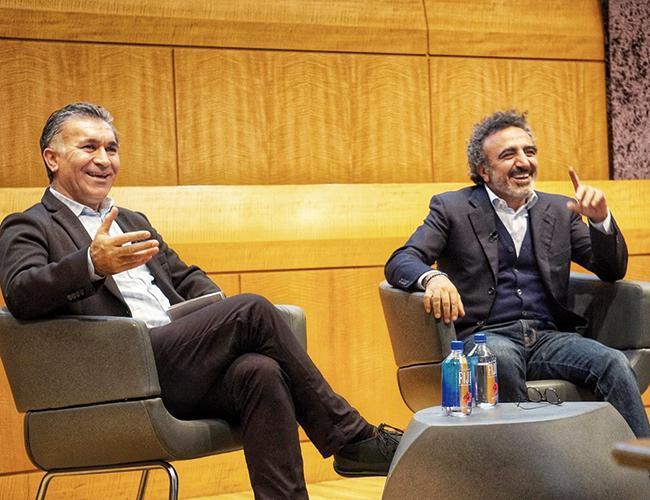
Smiling, with a full head of curly, salt-and-pepper hair, Hamdi Ulukaya has a humble and friendly attitude. The Turkish businessman that founded Chobani yogurts, one of the leading yogurt brands of the U. S., announced the launch of his new initiative Nov. 17 evening in New York University’s Tisch Hall.
Hamdi Ulukaya Girişimi (HUG) aims to support young Turkish entrepreneurs that already have a start-up or have an idea for a start-up.
“We [Turkish people] find solutions, we don’t give up, we have optimism, and we are survivors. If you implement these in a field of business or entrepreneurship, you have a lot of advantage,” Ulukaya said about the idea behind his initiative.
“What is missing is self-confidence,” he added.
That is why, Ulukaya said, he told the young businesspeople-to-be arriving for HUG’s New York boot-camp that he was not going to teach anything but that they were going to share.
“The main goal is reminding you who you are. You are no more or less than anyone else. You are good enough to do this, stop thinking you cannot. If you don’t believe it, look at me,” he said with a smile that made the audience laugh. “Come as who you are,” he said, “If you come pretending to be something else, then you will create someone else’s world.”
Ulukaya came to the U.S. in 1994, and in 2005 started Chobani yogurt, which has estimated annual sales of $211.43 million as of 2017. He has made his way to the Forbes billionaires list. Yet he has always been proud of his humble roots.
One day “about two or three years” after he started Chobani, he told his factory workers, according to his own account, to slap him if he started acting very differently, as someone he was not.
“Because I was afraid, I did not know what I was going to do. They were telling you they were going to give you billions. What are you going to do?” he said.
‘A good start-up’
Ulukaya was born and raised in Turkey’s eastern provinces of Tunceli and Erzincan. In New York, he went on to found a cheese factory, named Euphrates, upon his father’s suggestion.
He describes the experience as one where everything went wrong, which ended up making him the man he is today because he “would do everything in his life not to go through that experience again.”
HUG has on its board Turkish professors and entrepreneurs who live and work in the U.S.
The initiative, which Ulukaya described as a “good start-up” that he, himself would invest in, elected 24 of the 3,000 applicants last year, according to New York University (NYU) Professor of Applied Psychology Selçuk Şirin, a board member of HUG.
He said they used the data from Turkish Census Bureau to divide the country into 12 parts, so as to give an equal chance to young people from smaller provinces as they do to young people from big cities such as Istanbul. They were also careful in giving equal chances to female entrepreneurs, and the program attained a 50 percent female to male ratio.
The participants were taken through a week-long boot-camp first in Turkey. They then traveled to the U.S. to attend a second boot-camp, where, for three weeks, they attended three-hour seminars at NYU each day. They also got to meet professionals working in multi-national corporates and were each assigned a mentor, a Turkish professional living and working in New York.
The program involved visits to museums and cultural centers to introduce participants to the American culture. They traveled to MIT’s Media Lab, Cambridge Innovation Center, and Google’s New York office.
Speaking during the launch, Clinical Associate Professor of Medicine at NYU School of Medicine Gül Bahtiyar said that participants were very passionate, courageous and humble.
“My mentee was Sevil from Hakkari, Yüksekova [southeastern province in Turkey]. She is an amazing woman, I have so much hope for her,” she said, getting emotional at times while speaking of the connection they had established.
Şirin thanked the mentors of previous “class” of young entrepreneurs and encouraged the mostly-Turkish audience to contribute to the program by volunteering to be mentors for the next class.
He said one of the companies that was incepted at the program had already launched, not even six months after the end of the boot-camp.
One such mentor was documentary film producer Şirin Aysan, who, in an interview with the Hürriyet Daily News, said she was the mentor for the 24-year-old Gizem.
Together they created a job schedule. Gizem’s website is designed to encourage teenagers, from mostly rural areas, to dream and be creative, especially in technological fields. It is due to be launched in a month’s time, Aysan said.
Another mentor was Uğraş Uzun, who said he was impressed by the energy and excitement of the young people that participated in HUG.
“What started as a very formal relationship, ended up turning into an older-brother-younger-sister one. An environment of trust was created,” he said.
His mentee, Başak, was first undecided but has, with encouragement from Uzun, concentrated on blueberry cultivation and the fruit’s use in produced goods.
“It is an incredible responsibility to be the person someone looks to, to decide the direction he or she will give to his or her life. But I am happy to be taking that responsibility,” said Uzun.
Ulukaya is no new-comer to the philanthropy game. He had founded The Tent Foundation, which aims to improve the lives of people around the world who have been forced to abandon their homes in search for safety. It currently has 78 partners, among which are Soros Fund Management and Facebook, as well as 12 non-governmental organizations that include the United Nations High Commissioner for Refugees (UNHCR.)